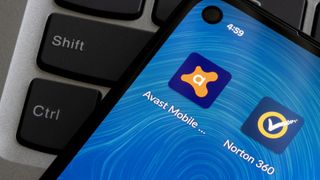NortonLifelock merging with Avast — what does this mean for you?
NortonLifelock merging with Avast — what does this mean for you?

Final calendar week U.S.-based NortonLifeLock, the world'south biggest antivirus company by market share, announced that information technology was intending to merge with Czech Commonwealth-based Avast, the earth'south second-largest antivirus visitor, pending shareholder and regulatory approval. The combined company would have a whopping 25% of the global Windows antivirus market.
This news came eight months after NortonLifeLock bought Germany-based Avira , and v years subsequently Avast gobbled up its Czech rival AVG. A month later the Avira deal airtight in January of this yr, Avira itself absorbed London-based antivirus maker Bullguard.
- Your Wi-Fi router might tell anybody where you live — hither's what you can do
- The best antivirus software, gratuitous and paid
- Plus: How to see who'southward on your Wi-Fi network
If this latest deal goes through, Norton, which itself bought identity-theft-protection industry leader LifeLock in 2017, will get the General Motors of the consumer antivirus industry.
The move could have a directly impact on consumers. Avast, AVG and Avira are all known for dependable, free antivirus software, while Norton has no complimentary antivirus offerings and charges some of the highest prices in the industry.
So what does all this rapid consolidation mean for the free antivirus industry?
Don't fix what ain't broke
If Avira'south current state of affairs is any guide, the intended merger may not change much for the short term. Norton seems to have left Avira pretty much alone since its acquisition, with Avira retaining its own software, marketing and even PR team.
There'south well-nigh no indication on the Avira website that Norton now owns it, and the companies notwithstanding utilise separate malware-detection engines, as indicated past their differing lab-examination scores.
Also, Avast has retained AVG's branding and marketing five years after those two companies merged, along with split product lines. Avast's statement has always been that AVG was strong in regions where Avast was weak, and vice versa, so information technology made sense to combine them as separate brands.
Current Avast CEO Ondrej Vlcek echoed similar themes in the Norton merger proclamation, stressing the "greater geographic diversification" that the "well-established" brands would evangelize.
Simply under the surface, the Avast and AVG malware-detection engines were combined — for the ameliorate, co-ordinate to 3rd-party lab tests — and back-office redundancies were eliminated.
We accept to expect similar consolidation and streamlining volition take place within the new Avast-AVG-Avira-BullGuard-NortonLifeLock behemoth.
I thing we won't see is the end of free antivirus software. In some grade or other, Avast, AVG and Avira will still continue to offer it, although i or two of the brands may be "retired" like sometime car models.
Dissimilar its rivals Kaspersky and Bitdefender, Norton has never offered free AV software, so this deal and the Avira one earlier information technology close that gap.
The looming specter of Microsoft
The bigger issue looming on the horizon is how long the status quo in the antivirus manufacture tin can last. The Microsoft Defender antivirus software built into Windows used to be an embarrassing joke, just in the past few years it's fabricated a remarkable turnaround and is now ane of the best antivirus programs in the manufacture.
Microsoft Defender notwithstanding has a few shortfalls — it doesn't fairly protect web browsers that aren't made by Microsoft, for example — but you lot tin can now legitimately say that it'southward all the antivirus software yous need, as long as you don't require actress features like parental-control software or a countersign manager.
So where does this leave the third-party antivirus providers? Why would you pay for one if you lot tin can get what yous need for free from Microsoft?
Consumers don't yet seem to be asking themselves these questions. The antivirus marketplace is booming, and 82% of U.S. households reported using antivirus software in a recent survey.
But virtually of the bigger brands have been rapidly adding actress features to their software, such every bit parental-control software and password managers, that Microsoft Antivirus doesn't immediately provide.
Norton has gone farther than any other antivirus provider in this regard, with its pricier plans also including backup software, online storage, unlimited VPN service and total identity-theft protection. It has already positioned itself as the ane-stop shop for all your security and privacy needs.
With its acquisition of Avast, and the huge market place share that will effect, Norton may be trying to bulk itself up against a possible manufacture decimation and brand itself, well, too big to fail. With 5 well-known brands nether its belt, it's certainly going to be hard to avoid.
Source: https://www.tomsguide.com/news/avast-norton-merger-what-means-for-you
Posted by: smithocied1993.blogspot.com


0 Response to "NortonLifelock merging with Avast — what does this mean for you?"
Post a Comment